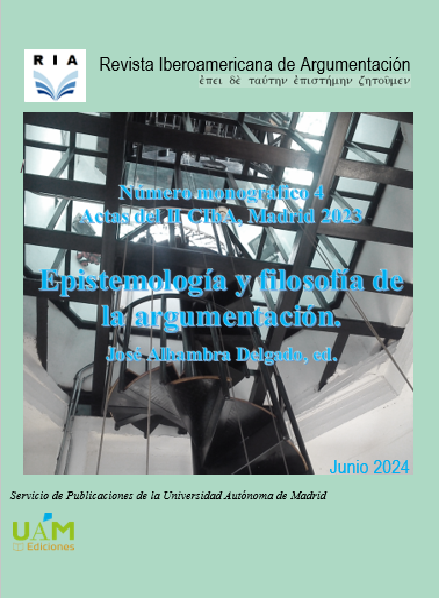Sobre la definición de los modelos estructurados incompletos de argumentación
Palavras-chave:
argumentación formal, Dung, instanciaciones, modelos abstractos, modelos estructurados, modelos incompletos, modelos con incertidumbre, sistemas estructuradosDireitos de Autor (c) 2024 Revista Iberoamericana de Argumentación

Este trabalho encontra-se publicado com a Licença Internacional Creative Commons Atribuição-NãoComercial-SemDerivações 4.0.
Resumo
Este artículo versa sobre cómo instanciar los modelos abstractos incompletos de argumentación en sistemas estructurados de argumentación, en concreto en ASPIC+. El objetivo fundamental del trabajo se motiva partiendo de argumentos generales en contra de la proliferación indiscriminada de los modelos abstractos en argumentación formal y la necesidad de estudiar sus instancias para evitar el modelado ad-hoc de ejemplos y descubrir posibles asunciones implícitas. El énfasis del trabajo es conceptual, mostrando cómo algunas asunciones que subyacen a los modelos abstractos incompletos no son del todo ciertas cuando se estudian los detalles de sus instancias.
Downloads
Referências
Baumeister, D., Järvisalo, M., Neugebauer, D., Niskanen, A., & Rothe, J. (2021). “Acceptance in incomplete argumentation frameworks”. Artificial Intelligence, 295, 103470.
Baroni, P., Gabbay, D., Giacomin, M., & Van der Torre, L. (2018). Handbook of formal argumentation (volume 1). College Publications.
Bench-Capon, T. J., & Dunne, P. E. (2007). “Argumentation in artificial intelligence.” Artificial intelligence, 171(10-15), 619-641.
Cohen, A., Parsons, S., Sklar, E. I., & McBurney, P. (2018). “A characterization of types of support between structured arguments and their relationship with support in abstract argumentation”. International Journal of Approximate Reasoning, 94, 76-104.
Dung, P. M. (1995). “On the acceptability of arguments and its fundamental role in nonmonotonic reasoning, logic programming and n-person games”. Artificial intelligence, 77(2), 321-357.
Gabbay, D., Giacomin, M., Simari, G. R. & Thimm, M. (2021). Handbook of formal argumentation (volume 2). College Publications.
Fagin, R., & Halpern, J. Y. (1987). “Belief, awareness, and limited reasoning”. Artificial intelligence, 34(1), 39-76.
Mailly, J. G. (2022). “Yes, no, maybe, I don’t know: Complexity and application of abstract argumentation with incomplete knowledge”. Argument & Computation, 13(3), 291-324.
Marraud, H. (2017). “De las siete maneras de contraargumentar”. Quadripartita ratio, (4), 52-57.
Modgil, S., & Prakken, H. (2013). “A general account of argumentation with preferences”. Artificial Intelligence, 195, 361-397.
Modgil, S., & Prak ken, H. (2014). “The ASPIC+ framework for structured argumentation: a tutorial”. Argument & Computation, 5(1), 31-62.
Odekerken, D., Lehtonen, T., Borg, A., Wallner, J. P., & Järvisalo, M. (2023). “Argumentative reasoning in ASPIC+ under incomplete information”. En: P. Marquis, T. Cao Son, G. Kern-Isberner (Eds.), Proceedings of the International Conference on Principles of Knowledge Representation and Reasoning (Vol. 19, No. 1, pp. 531-541). IJCAI Organization.
Prakken, H. (2017). “Historical overview of formal argumentation”. IfCoLog Journal of Logics and their Applications, 4(8), 2183-2262.
Prakken, H., & De Winter, M. (2018). “Abstraction in Argumentation: Necessary but Dangerous”. En: S. Modgil, K. Budzynska, J. Lawrence (Eds.), Computational Models of Argument (pp. 85-96). IOS Press.
Yuste-Ginel, A., & Herzig, A. (2023). “Qualitative uncertainty and dynamics of argumentation through dynamic logic”. Journal of Logic and Computation, 33(2), 370-405.
Yuste-Ginel, A., & Proietti, C. (2023). “On the instantiation of argument-incomplete argumentation frameworks”. En: G. Alfano y S. Ferilli (Eds.) AI^3 2023 7th Workshop on Advances in Argumentation in Artificial Intelligence. CEUR.
